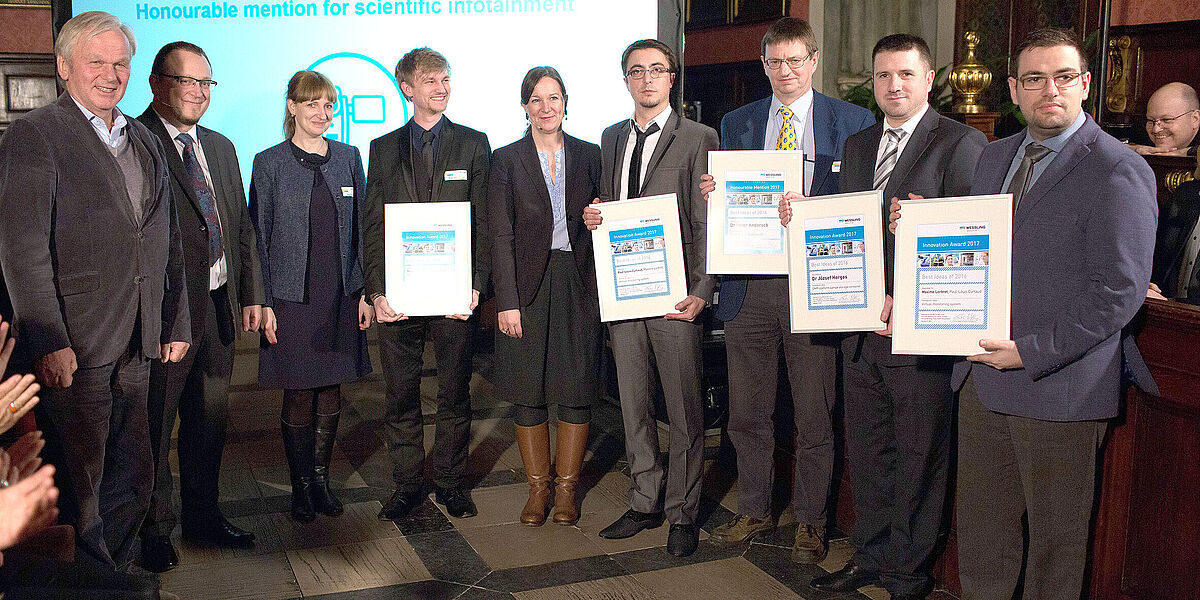Innovation strength from everyday working life
“The best and most sustainable innovations result from a company constantly putting every process to the test”, says Florian Weßling. “This is why our employees can and should develop new ideas in their daily working life at any time. This approach is firmly embedded in our DNA”, explains WESSLING’s Managing Shareholder. 1,600 employees at 26 sites in Europe and China work together with their customers to find the best solutions regarding high-quality laboratory analysis and engineering consultancy services.

“We are a learning company, in which our employees are highly motivated in improving our processes, products and services”, Dr Erwin Weßling, founder of the family business, adds in describing the basis of innovations at WESSLING. “Every employee sees himself as a solution finder and in doing so always keeps an eye on our customers’ needs. This is how our colleagues decisively contribute to our success.” In order to increase its innovation power, the company also engages in cooperation with universities and technical colleges, participates in research and development projects and collaborates in DIN and technical committees.
For the tenth time now, this innovation culture has found visible expression in the WESSLING Innovation Award, honouring employees from France, Hungary and Germany during a ceremony in Kraków in Poland. This year, the award was presented at a highly symbolic site: the Collegium Maius of the Jagiellonian University, which was established in 1364 as the second oldest university in Europe and specialises in the natural sciences. Approximately 30 teams or individual employees had submitted their ideas for the prize endowed with a total of 10,000 euros. “We have 40 different professions in our company, half of them are natural scientists and engineers. This leads to many groups participating in the award being interdisciplinary in structure”, says Diana Weßling, spokeswoman of the Shareholder family. “So again and again, we dare to think outside the box, which makes all the difference.”
Prepare food and feedstuffs more efficiently
A good example for this is one of the winning teams. Quality Manager Natalie Ganzauer and the Laboratory Technicians Brian Patrick Morrison and Julius Pollhäne from the WESSLING site in Berlin have jointly developed a new method for a more efficient analysis of food and feedstuffs. For example, foodstuffs are tested for several hundreds, which are partially very instable pesticides. The laboratory colleagues cool and powder the starting material to obtain a homogeneous sample and later to be able to make a representative report. So far, the laboratories used solid carbon dioxide, commonly known as ‘dry ice’, which cools the product to about minus 78 degrees Celsius. The Berlin team searched for alternatives and tried liquid nitrogen. The process of cryogenic comminution, as it is called, achieves extremely low temperatures of minus 196 degrees Celsius. This now for the first time enables a more precise and faster identification of particularly unstable sulphur-containing pesticides: dithiocarbamates. The procedure is so innovative that the company works on including this new process in the EU Commission’s quality guidelines for pesticide analysis in food and feedstuffs.
Improved storage of medication samples
Award winner Dr József Horgos focused on a very different topic. In his capacity as a so-called ‘Qualified Person’, he has a very special task at the site in Hungary. Whenever WESSLING analyses pharmaceutical products for companies and approves them for market release, reference samples have to be professionally stored for up to one year beyond their expire date. On average, this is three to six years, in which Horgos is responsible for making sure that the medication can be analysed again at any time, for example, in the event of complaints. So far, the pharmacist at the laboratory in Budapest only had space for 200 samples, which was by no means sufficient. nowhere near enough. Therefore József Horgos has developed a specially secured cabinet that can be stacked on pallets in a special service provider’s high rack warehouse; if necessary, up to 2,000 pallets and around 112,000 samples can be stored in this way. Moreover, the warehouse fulfils all guidelines regarding temperature and humidity and is only accessible only to authorised personnel. Last, but not least, this also reduces the storage costs, which in turn benefits the WESSLING customers.
Hard- and software for more security and efficiency
At WESSLING France, Head of IT Paul-Louis Curtaud and software developer Maxime Lerbret have contributed their knowledge to optimise test chamber tests that measure the emissions released by building materials in interior spaces. The tests take place in about 50 chambers which must have clearly defined climatic conditions around the clock for 28 days. So far, the laboratory employees had to be constantly on site to monitor the humidity and temperature. The two award winners have now installed USB thermometers and hygrometer sensors that can be read remotely from any site by remote control. The probes are moreover used within a network, which saves physical computers and therefore space and costs. At the same time, the system provides more security because data loss is excluded, for instance, if the software on one computer is damaged. Paul-Louis Curtaud and Maxime Lerbret have additionally developed a programme that automatically saves the measured data every ten minutes.
Natural science infotainment
WESSLING’s work is often complex and thus not easy to convey to others. Experts therefore often have to go into more detail hen presenting their expertise at the WESSLING Academy and numerous external events. Dr Peter Andersch, Technical Director of Laboratories at the Münster site, has found a way to present scientific contexts in a simple manner. In a technical lecture, he provides an introduction into complex topics such as physical and chemical interactions in an amusing and comprehensible manner and compares generics and original medicines In doing so, he uses a kind of representative: the ‘AnalyTiger’, a soft toy that provides more vividness and comprehensibility during the presentation. Andersch received praise and acknowledgement for his concept.